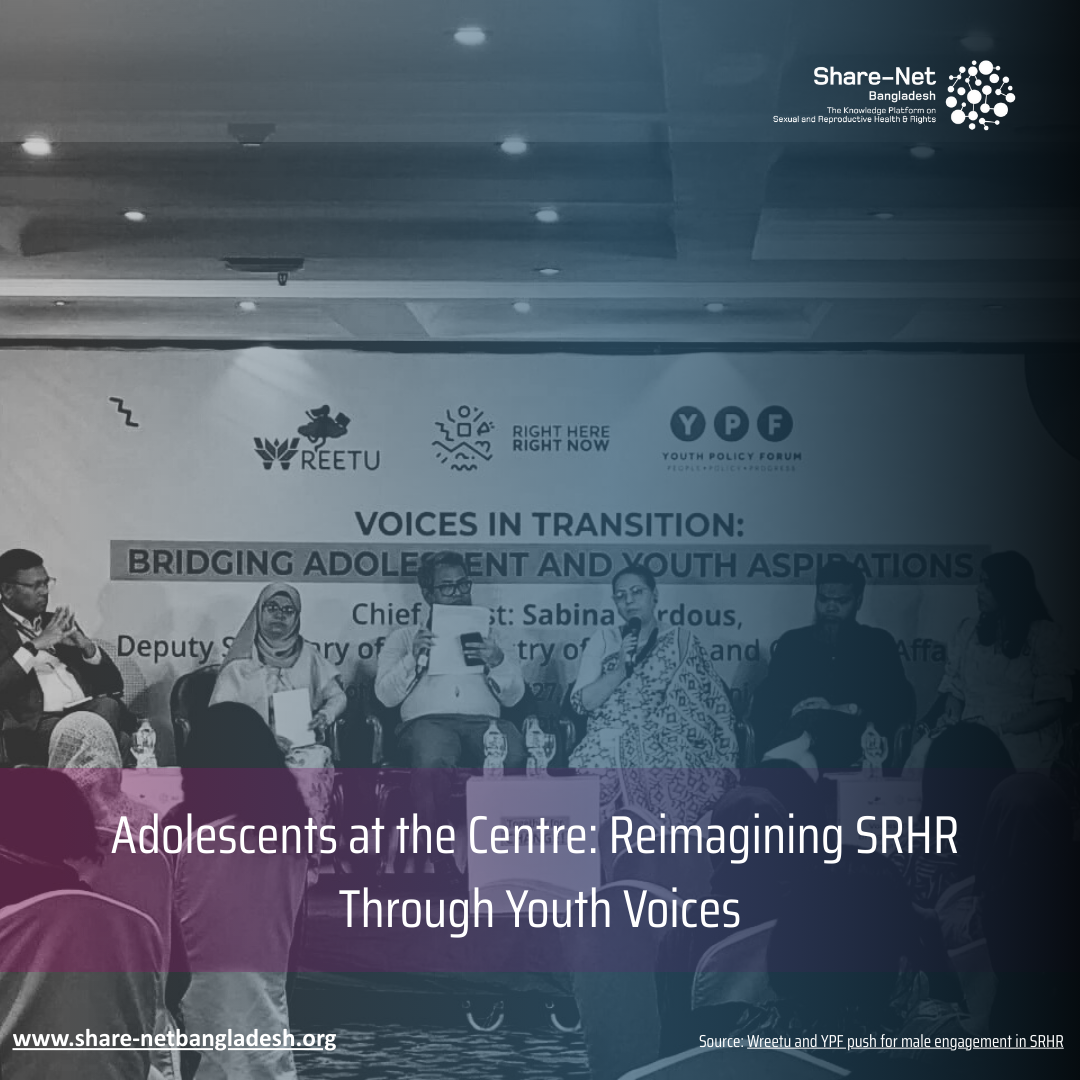Adolescents at the Centre: Reimagining SRHR Through Youth Voices
While ‘youth voice’ is often just a buzzword, “Voices in Transition: Bridging Adolescent and Youth Aspirations” stood out for its real impact. Organised by Youth Policy Forum (YPF) and Wreetu Health and Well-being Foundation, the half-day event took place on September 2, 2025, at Hotel Sarina in Banani, Dhaka, as part of the Right Here Right Now (RHRN2) coalition project. Sharing two years of education and allowing teenagers and young adults to share their experiences influencing improved SRHR (Sexual and Reproductive Health and Rights) efforts in Bangladesh was the straightforward objective.
The main part of the programme focused on “Reproductive Health and Rights with Boys’ and Men’s Engagement”, a topic that can be challenging but is essential for lasting change. The session featured speakers from government and civil society, including Senior Policy Advisor Mushfiqua Zaman Satiar from the Embassy of the Netherlands in Bangladesh, as well as practitioners and youth advocates who have had spent the past two years developing tools and spaces for dialogue.
While policy set the foundation for the day, creative projects brought it to life. The team launched “Mind, Voice, and Justice”, a magazine created by youth that combines personal stories and analysis. This, along with the project’s dialogue series and a poster exhibition, showed that young people were truly involved in shaping the work. Ultimately, organisational brilliance in Gender, SRHR, and Justice, etc. was recognised, highlighting the wide reach of NGOs, policymakers, and practitioners working in this field and the hope that these lessons will spread further.
During the question-answer session, concerns were raised regarding the periphery of the current school curriculums addressing adolescent SRHR comprehensively and what risks arise from gaps in education. Later on, the discussion also focused on issues like climate change, migration, and digitalisation, and how they are associated with adolescents’ access to healthcare. Organisers pointed out that environmental problems are already impacting health and opportunities in Bangladesh’s coastal areas. Nineteen coastal districts are dealing with a serious drinking-water crisis affecting about 35 million people. Rising salinity from climate change, higher sea levels, extreme weather, and unplanned shrimp farming are all making life harder and putting reproductive health and rights at risk.
Seen in this light, involving boys and men is not a distraction from youth priorities. Instead, it is a practical way to build shared responsibility in communities facing tough challenges. A panel discussion on Advancing Reproductive Health and Rights with Boys and Men’s Engagement took place, moderated by Dr. Mohammad Bellal Hossain, Professor, Department of Population Sciences, University of Dhaka. The discussion suggested that youth health and sexual and reproductive health rights are critical components for creating fair and resilient communities. Tackling these challenges involves not only guaranteeing access to reliable information and services but also involving boys and men as partners in breaking down detrimental norms and practices.
The Quasi-Experimental Study on the Effect of Puberty Education Sessions on Adolescents was presented at the event by Tasnim Shams. Dr. Mohammad Bellal Hossain and Sharmin Kabir showed that boys in the control group had a higher prevalence of misconceptions, risky behaviours and hygiene interactions, which was also reiterated by the document adopted at the Youth Parliamentary Debate Session held on December 23rd, 2024. A brilliant addition to the event was the launch of ‘Mind, Voice and Justice’, a brand-new magazine launch, which was a youth-focused SRHR magazine presented by Youth Policy Forum-YPF.
A sustainable method requires inclusive conversation, policy changes, and community-driven projects that acknowledge adolescents as rights-holders and engaged participants. In this context, bridging aspirations focuses less on transition as a stage and more on establishing enduring frameworks that preserve dignity, agency, and justice for every young individual, as reflected by Shashwatee Biplob, Associate Director, GJD, SELP, BRAC, in her closing remarks for the event, which was followed by a networking session marking the end of the event.
The event served as a testament to the significance of youth-led discourse in forming sustainable and inclusive policies. A collective effort from all the stakeholders can effectively mitigate and bridge existing gender and knowledge gaps in the SRHR landscape.
Source:
- Right Here Right Now – Bangladesh Platform
- Wreetu and YPF push for male engagement in SRHR
- Factors associated with male involvement in reproductive care in Bangladesh
- Methodological Challenges in Conducting Sexual and Reproductive …

